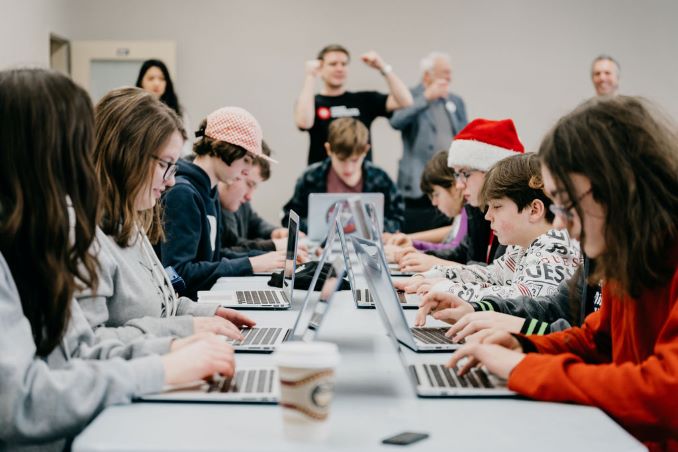We spoke to Anna Villanueva, the Educator Program Manager at Canada Learning Code, to learn more about how we can make the world of computer science easier to access and more diverse. Anna is responsible for the development of experiences and materials for educators in Canada and has close to 10 years worth of professional experience in education, including a Masters degree in Child Study and Development.

Describe your charity/non-profit in a few sentences.
Canada Learning Code (CLC), is Canada’s leading national charity championing computer science education. CLC works from coast-to-coast-to-coast to make sure that everyone in Canada has access to the knowledge they need to prosper in our digital world.
Today, Canada Learning Code operates in over 250 communities across the country, driving impact through program design and delivery, strategic industry and public partnerships, research and advocacy. To date, the organization has had over 600,000 learners attend an in-person or live online experience.
What problem does it aim to solve?
Technology is ever-evolving, and our day-to-day lives at work, school and home are becoming more dependent on digital services. Through our programs at CLC we aim to provide opportunities for all communities in Canada – particularly women-identified, transgender and beyond binary individuals; Black, Indigenous and People of Color (BIPOC) communities – to have access to computer science education and build the digital skills they need to thrive in our rapidly changing digital world.
When did you start/join it?
I joined in August of 2019.
What made you want to get involved?
I was inspired by the mission of CLC, bringing access to coding and computer science education to every individual in Canada. Additionally, in my role, I love having the opportunity to work on programs and initiatives that are directly supporting our teachers having been one myself.
What was the situation like when you started?
In Canada, there did not seem to be documentation on what learning outcomes should or could look like for Computer Science education at every grade level, specifically from Kindergarten through to Grade 8. We lacked a clear pathway for teachers or students on how to get from a novice level of learning to an intermediate or senior level.
How has it changed since?
CLC has introduced the K-12 Computer Science Education Framework which provides a clear and consistent recommendation for learning outcomes in computer science at all grade levels. It was developed in collaboration with an advisory board and key industry stakeholders. The hope is that through this framework, teachers will have a resource on how to support their students as they progress and develop their skills within computer science education.
What more needs to be done?
As a follow up to the suggested learning outcomes provided within the K-12 Framework, we need to build explicit links to activities for each learning outcome that educators can use within their own classrooms to help students unlock these skills. For a teacher who is just beginning to teach coding, it may not be intuitive as to what activity should be done in order to unlock a specific outcome that is outlined in the framework.
Overall, this work is always ongoing at CLC. We’re committed to continuing to support teachers across Canada by providing new and comprehensive resources to support in bringing computer science education to their classrooms.
How can our readers help?
They can join one of our learning experiences! We have a program for varying levels of coding experience. We’d love to have them join us for one of our virtual workshops and share their experience with friends and family.
Do you have any events coming up?
CLC offers ongoing workshops and learning experiences throughout the year for hands-on experiences.
Recently, CLC hosted our fourth annual Canada Learning Code Week. Registered participants received unique, fun and relevant learning activities straight to their inbox. The theme of CLC Week was Digital Citizenship: Staying Safe Online, with lesson plans and training materials focused on providing students in Canada with the tools they need to be safe and responsible in our ever-changing digital spaces.
Special guests included The Honourable Navdeep Bains (Minister of Innovation, Science and Industry), Adam van Koeverden (Member of Parliament) and Bill Nye. Through this free initiative, thousands of educators and parents across Canada can become equipped to teach and learn computer science.
Where can we follow you?
Make sure to follow us on Twitter at @learningcode, Instagram at @learningcode, TikTok at @learningcode and Facebook at @canadalearningcode to stay up to date with all the latest events, learning resources, exciting partnerships and so much more!
PAY IT FORWARD: What is an awesome Toronto charity that you love?
Visions of Science is an amazing organization with the mission of advancing education achievements and positive development of youth from low-income and marginalized communities through meaningful engagement in science, technology, engineering and mathematics (STEM) fields and research. They serve youth in over 25 different communities across the GTA. You can follow them at @visionsofscience
